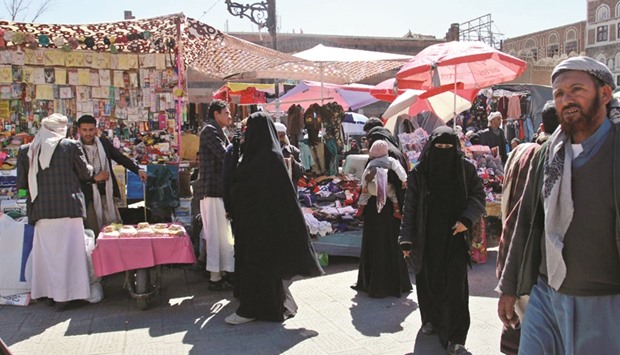Yemen rebels and loyalist forces battled yesterday around third city Taiz even as a 48-hour ceasefire announced by a Saudi-led coalition fighting the insurgents began following US pressure.
A few hours after the ceasefire took effect at midday (0900 GMT), fighting still raged around the flashpoint southwestern city, where violence has killed dozens this week, despite clashes subsiding on several fronts.
Clashes were heaviest in the town of Salo southeast of Taiz, military sources said, reporting casualties on both sides.
Inside Taiz itself, rebel rocket fire into a residential district killed three civilians and wounded two, military and medical sources said.
Four rebels and two loyalists were also killed in or near Taiz, military sources added.
Near the Saudi border further north, two ballistic missiles fired by the rebels hit the coastal area of Midi killing two pro-government soldiers and wounding four, a military commander said.
Intermittent fighting was also reported in Nahm near the capital Sanaa, in Shabwa in the south and Sarwah to the east.
The ceasefire comes after US Secretary of State John Kerry last week met rebel representatives in Oman and also urged the government to come on board.
At first the government rejected the peace bid, saying it had not been consulted.
But it has come under huge pressure to back down in the face of an international outcry over the mounting civilian death toll from 20 months of conflict.
“There are international pressures to observe a ceasefire and to resume (peace) negotiations,” a source close to the presidency said. The 48-hour truce could be extended if the rebels hold fire and allow aid into besieged loyalist enclaves, the coalition statement said.
“We really hope that the war will end. All Yemenis are very tired of the conflict,” said Sanaa resident Khaled al-Waysi.
Another resident, Sadeq Juhaifi, said: “We want one of the parties to be courageous enough to announce longterm peace, not just a two or one-day ceasefire.”
AFP received a copy of a defence ministry document ordering all pro-government forces to abide by the ceasefire, report violations, and reserve the right to respond to any rebel breaches.
A spokesman for forces allied to the Iran-backed rebels, Brigadier General Sharaf Luqman, confirmed that they would also abide by the ceasefire.
“Based on the agreement reached in Muscat, we affirm our commitment to the ceasefire if the other party respects it,” Luqman said of the accord signed on Monday with Kerry.
Six previous attempts to clinch a ceasefire have foundered, the latest in October.
All those truces were “useless”, said Sanaa resident Abdullah Hasan.
“We need a real truce, not one which is just for media consumption,” added the 29-year-old.
UN envoy Ismail Ould Cheikh Ahmed urged all parties “to encourage full respect for the cessation of hostilities and to ensure that it leads to a permanent and lasting end to the conflict”.
Exiled President Abd-Rabbu Mansour Hadi has rejected a UN proposal to step down while his government forms a unity administration with the rebels.
In an apparent bid to prove his legitimacy, the coalition underlined that the ceasefire came at Hadi’s request.
The president asked Saudi King Salman for the pause “in response to UN and international efforts to bring peace to Yemen” and allow aid deliveries, its statement said.
UN humanitarian office deputy spokesman Jens Laerke hoped that, if respected, the truce would offer respite to civilians and give humanitarian organisations an “opportunity” to respond to aid needs nationwide.
“A large humanitarian effort is already underway in Yemen,” he said.
Millions of civilians, many of whom have fled their homes, desperately need humanitarian aid.
The coalition’s air and sea blockade on Yemen will remain in place during the ceasefire, it said.
The rebels still control Sanaa and most of the northern and central highlands.
Some loyalist-held towns are under rebel siege, including Taiz.

Yemenis shop at a market yesterday in Sanaa as a 48-hour ceasefire began.
